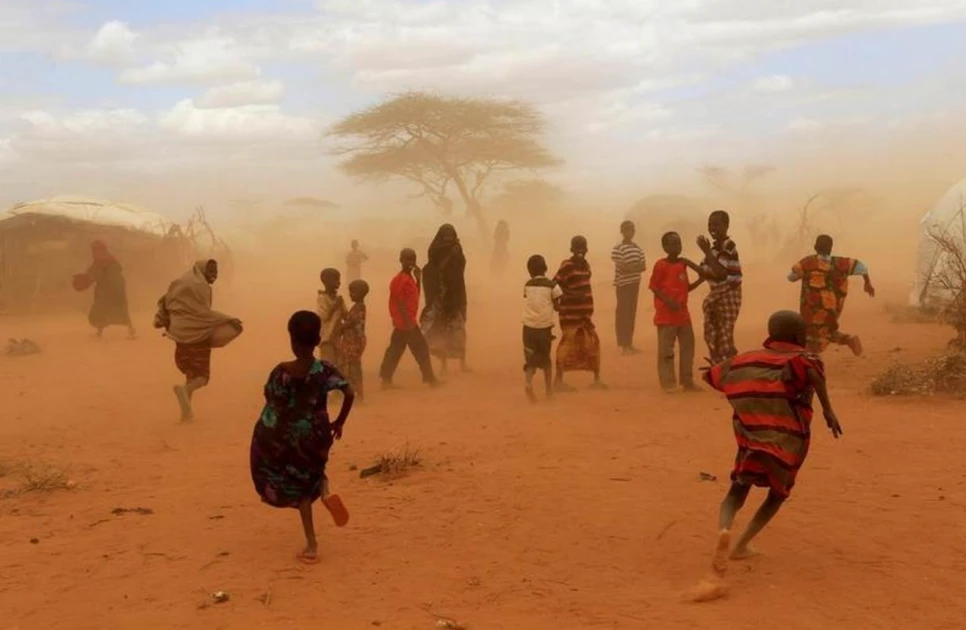OPINION: The political economy of marginalised regions - A story of structured neglect and silent resilience

Newly-arrived refugees run away from a cloud of dust at the Dagahaley refugee camp in Dadaab, near Kenya's border with Somalia in Garissa County, Kenya, July 16, 2011. REUTERS/Thomas Mukoya/File Photo

By Mustafa Abdirashid
From the rolling
plains of North Eastern Kenya to the dry valleys of Turkana, the political
economy of marginalised regions remains one of the most misunderstood and
deliberately under-discussed topics in our national discourse. While the
Constitution of Kenya 2010 promised a new dawn of inclusivity and equity, the
lived reality in these regions still mirrors the shadow of colonial neglect and
post-independence betrayal.
At the heart of
this political economy is a paradox: these areas are politically instrumental
but economically ignored. They hold votes, they sway blocs, they birth
loyalties and yet when the dust of elections settles, they are left with dry
taps, empty clinics, impassable roads, and a youth demographic simmering with
frustration.
Devolution: A promise
half-kept
Devolution was
meant to disrupt this structural imbalance to take resources closer to the
people and give historically sidelined communities a shot at meaningful
development. And for a brief moment, hope bloomed. New county headquarters rose
from the dust. Locals, for the first time, had access to bursaries and services
previously locked behind distance and discrimination.
But what
devolution gave with one hand, elite capture took with the other. A new class
of local gatekeepers emerged, replicating the same extractive politics they
once condemned. Budgets ballooned, but service delivery remained skeletal. The
powerful aligned with contractors, and procurement became a tool of patronage.
The politics of pending
bills and development deadlocks
One of the
clearest indicators of the economic strangulation in these regions is the
growing mountain of pending bills. Local contractors, many of them young,
inexperienced but hopeful, are roped into county tenders with promises of
payment. They take loans, they mortgage property, they deliver. Then they wait.
And wait. Some sink into depression. Others face auctioneers. A few,
tragically, disappear from the economic landscape entirely.
This system of
deferred payment is not accidental. It’s a form of economic control that keeps
the local economy docile, indebted, and pliable. When bills remain pending,
development remains pending. And so does freedom.
What is often
misrepresented as underdevelopment is, in truth, underdevelopment by design.
The political economy of marginalised regions thrives on dependency. Relief
food becomes seasonal theatre. Water trucking becomes a million-shilling
industry. ID registration becomes a political favor. Insecurity becomes a
justification for exclusion.
This economy
doesn’t lack resources, it lacks fairness. For instance, a kilometre of road in
Garissa is priced the same as one in Kiambu, but the former takes five times
longer to complete due to logistical challenges and limited oversight. The
result? Infrastructural inequality dressed up as technical difficulty.
Youth, frustration,
and the absence of opportunity
Perhaps the most
volatile casualty of this political economy is the youth. Armed with degrees
but disarmed of opportunity, they roam towns with CVs in their backpacks and
hopelessness in their eyes. They are told to “innovate” but denied funding.
They are told to “wait their turn” in a queue that has no end.
The consequence is
visible, rising drug abuse, religious extremism, migration, and in worst cases,
radicalisation. When a young person sees the same faces rotate power for
decades with nothing to show for it but opulence, the system loses legitimacy.
A way forward: Beyond
tokenism
To truly transform
the political economy of marginalised regions, Kenya must go beyond token
representation and trickle-down projects. We need:
1. Transparent resource
allocation
The CRA formula
must genuinely reflect historical injustices and current needs.
2. Youth-focused economic
models
Regional revolving
funds and business incubators tailored to local challenges.
3. Independent development
oversight
Local development
boards free from political interference.
4. Civic education
and political literacy
To end
commercialized politics, the voter must understand the power of the ballot
beyond handouts.
Marginalisation is
not just about lack it’s about being deliberately kept out. But despite this,
the people of these regions remain resilient. They still dream. They still
vote. They still believe. Perhaps the question we must now ask is not whether
they are ready for change but whether the system is ready to let them thrive.
[Mustafa
Abdirashid is the current Deputy Speaker and MCA for Iftin ward in Garissa
County. He is also the former MCA for Fafi Ward, Fafi Constituency. He writes
on governance, youth, and the lived experience of marginalised communities. He
is currently working on a political memoir and a theatrical play exploring
state neglect in Kenya’s frontier counties.]
Want to send us a story? SMS to 25170 or WhatsApp 0743570000 or Submit on Citizen Digital or email wananchi@royalmedia.co.ke
Comments
No comments yet.


Leave a Comment